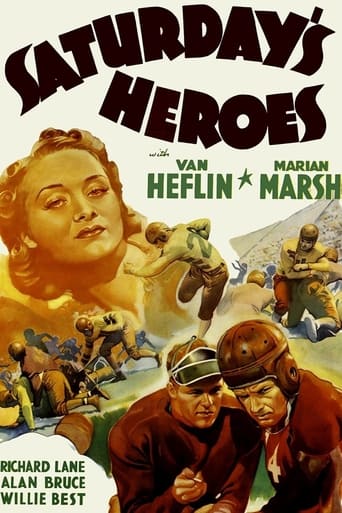MartinHafer
While Van Heflin was 27 years-old when he made this film and the film had a very muddled message about sportsmanship, at least the film was different and it was nice to see that Heflin had already developed a nice screen presence--one of apparent grace and ease. While not a great film, it is worth a peek.Heflin plays a star football player for a team that hasn't lost a game in three years. However, Heflin and some of the players are fat-heads. Heflin is by far the worst, as he earns extra money by selling his complementary tickets to scalpers (a clear violation of NCAA rules). When he is caught, he hypocritically starts a bizarre plot into motion--one that tries to expose the rampant rules violations condoned by the universities who should be policing themselves. Having Heflin be the man to lead this crusade is like having Bill Clinton leading a crusade against sexual harassment!! But despite this, the film is solidly entertaining throughout and although some elements of "the big game" are silly (such as spotting the other team a touchdown). It's not great entertainment and the message certainly is muddled, but somehow it manages to keep your interest.Sadly, the reforms suggested by the film are pretty good and school pretty much are apparently the same way now as they were then. A new reworking of this story (without such a totally flawed and hypocritical hero) would be a nice to see.
blanche-2
"Saturday's Heroes" is a 1937 programmer starring a very young Van Heflin as a college football hero. And what better time for TCM to show this film than on Super Bowl weekend? As others more knowledgeable than me have pointed out, the issues raised in the film exist today: college football is big business and filled with inequities for the players. In this film, Heflin and some other players scalp tickets so that they can make some money. They have scholarships, and the Heflin character complains that because of a heavy training schedule, they're not even getting the promised education.These programmers were used to groom future stars, and Heflin here is as excellent as he is in movies like "Johnny Eager." He was not a standard hunky leading man, though he was attractive and could handle romantic leads such as in "Possessed" as well as character roles. We lost him too soon.Interesting for early Heflin and for the timeliness of the film.
dougdoepke
The movie runs barely an hour and must have cost all of 50 bucks to make. What makes this little programmer noteworthy is its topic-- big time college football as a big time business. Actually the screenplay could have been plucked from today's sports headlines. Sixty years has made little difference in how the college game is played or in how players are affected by the commercialism.A very young Van Heflin is the team quarterback who gets his brains beat out every week for a scholarship but no money. So he picks up proceeds from illegal ticket-scalping. The coach knows it and so does the college president, but they look the other way because of his value to the team. So, in a clear sense, these school officials are parties to an illicit act.I like the way the screenplay shows how the practice is embedded in the larger school administration because of what the profits from big time football mean to the school and its alumni, despite the corruptive influence. Of course, the schemes for benefiting key players in today's game have gone far beyond penny-ante scalping, as sports headlines now and again indicate. Nonetheless, in the movie, Heflin's solution is a simple and straightforward one-- pay the players for performing. Then, of course, they're no longer amateurs, but at least an important element of corruption is removed from the game. The fact that big time college football continues the pretense of the amateur athlete shows not only the power of the mystique but the advantages of not having to pay the work force. And one reason I expect the movie got made when it did is because of the Depression era concern with the well-being of labor in all fields including even college football.The film itself is marred by a lot of silliness from Frank Sully as the stereotypical dumb lineman. There's also the usual boy-girl complications that include the super-cute Marian Marsh. On the other hand, there's some fine acting from Heflin, clearly on his way to bigger things, and also what I think is a legitimately funny running-gag from Al "Fuzzy" St. John as the grizzled "water boy". Though obviously dated in most respects, there remains a solid core of interest behind this cheap RKO programmer.
sandlot3
Still timely and with a strong supporting cast. Outspoken college football star Val Webster (Van Heflin) sounds off against collegiate political corruption. He is basically fed up with amateur athletes betting on games, scalping tickets and accepting subsidies. The same goes for the college board of directors, who pocket most of the profits. Webster is expelled but is aided by sportswriter Red Watson (Richard Lane) to expose them. And by winning the big game against them as the rival coach, he proves himself right and them wrong. He also wins the girl, of course. Heflin was well cast as an athlete as he was an accomplished swimmer, fisherman and sailor.


